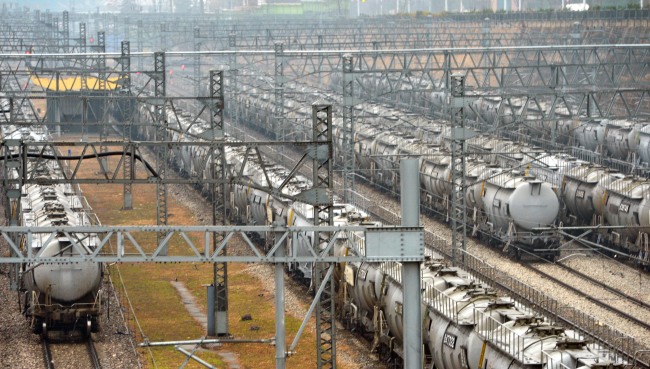Unionized rail workers launched a general strike Monday against a plan to launch a subsidiary for new bullet train operations, calling it a move to privatize the state-run rail operator.
The Korea Railroad Corp. filed complaints with police against nearly 200 union members for impeding business and threatened to take disciplinary measures against all participants in the walkout.
The strike caused no major disruptions to passenger transport services, including the KTX trains and Seoul subway lines, as the company deployed emergency staff.
The Korean Railway Workers’ Union began the walkout at 9 a.m. after failing to reach a compromise with KORAIL management.
The two have been at odds over the plan to operate a new KTX route connecting southern Seoul to major cities in the country. The union believes the plan would eventually lead to privatization, mass job losses and fare hikes.
The rail operator lashed out at the union, saying that it does not intend to privatize the state-run company. KORAIL reiterated that it will take a 41 percent stake in the new subsidiary and the rest will be managed by state funds. The company stressed that it would take measures to limit the number of private investors.
The union countered that the rules could be changed anytime.
The strike came a day before KORAIL was to hold a board meeting to further discuss the plan.
“We feel sorry about causing public concern … but suspending the board meeting scheduled for tomorrow is the only way to avert the strike,” the union said in a statement.
The union, which claims to have nearly 22,000 members, plans to hold a rally Tuesday in front of Seoul Station, the Seoul office of the Daejeon-based rail operator. It will demand that both the government and the company call off the plan. Unionized workers in other major cities planned to hold separate rallies. The union said that 8,500 workers would remain in their positions in order to offer the minimum essential services, it added.
To minimize public inconvenience, KORAIL said it would deploy 6,000 substitute workers.
KTX bullet trains, subways and commuter trains will not face major delays in Seoul, but the company plans to shut down 40 percent of the operations of Saemaul and Mugunghwa trains. Cargo train services will be reduced by 36 percent, compared to normal operations, the company said.
“We apologize for causing public concern. We did out best to narrow differences with the union at last-minute talks to avoid an extreme situation, but we failed,” said KORAIL CEO Choi Yeon-hye at a press conference.
The CEO said the union had no right to intervene in the company’s plan to hold its board meeting or in the government’s measures.
“The union has no legitimate reason to go on strike. It is clearly illegal,” she said.
KORAIL said it has sued a total of 194 unionized workers, including their leader Kim Myung-hwan.
The company warned rally participants to return to work and said the company would take disciplinary action against those who refused.
KORAIL said about 32 percent of its rail workers, around 2,400 employees, participated in the strike, while the union claimed that it was 76.4 percent.
The Transport Ministry also said it will take stern measures against the union if it continues to intervene in the public transportation service or cause any damage to KORAIL’s property.
It is the first general strike by the rail workers in four years and the largest labor action since President Park Geun-hye took office in February.
Fueling fears of further disruption to passenger services, the Seoul Subway Labor Union threatened to go on strike on Dec. 18, saying they would support the rail union. The union said it would reject the Seoul government’s emergency plan to increase the frequency of the train service to ease traffic disruptions caused by the railway workers’ strike.
The subway union is one of two major union groups organized by workers at Seoul Metro, the operator of Seoul subway lines 1 to 4.
By Cho Chung-un
(
christory@heraldcorp.com)





![[Exclusive] Hyundai Mobis eyes closer ties with BYD](http://res.heraldm.com/phpwas/restmb_idxmake.php?idx=644&simg=/content/image/2024/11/25/20241125050044_0.jpg)
![[Herald Review] 'Gangnam B-Side' combines social realism with masterful suspense, performance](http://res.heraldm.com/phpwas/restmb_idxmake.php?idx=644&simg=/content/image/2024/11/25/20241125050072_0.jpg)

